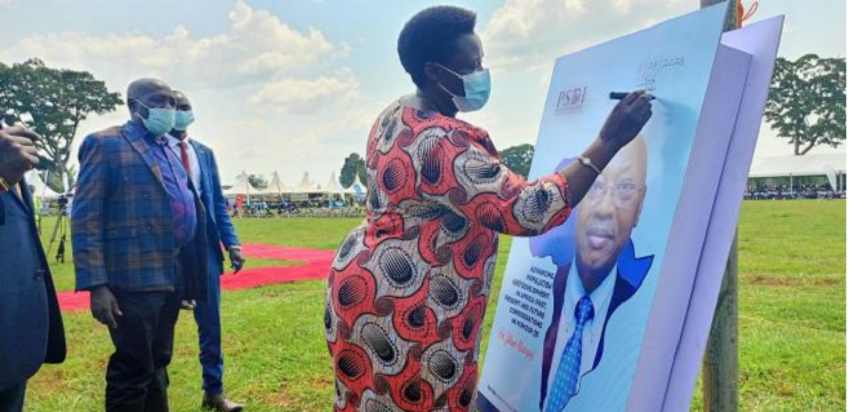Her excellency Jessica Alupo signing a book in honor of Dr. Jonathan Musinguzi (Photo by Immaculate Amony)
President Yoweri Kaguta Museveni has singled out “illegal fees” as a major factor contributing to the high rate of school dropouts in Uganda.
Speaking during the National celebration of World Population Day in Alebtong district, the President blamed some schools for imposing exorbitant fees on parents, hindering their ability to keep their children in school.
Uganda has made significant strides in achieving universal primary and secondary education through the Universal Primary Education (UPE) and Universal Secondary Education (USE) programs.
However, the President expressed concern that certain schools are exploiting the system by charging illegal fees, undermining the government’s efforts to provide free education.
In his message, delivered by Vice President Jessica Alupo, President Museveni emphasized the need for technical skills development among youth as an alternative to solely pursuing white-collar jobs.
He highlighted the importance of empowering young people with practical skills that can enhance their employability and contribute to the country’s economic growth.
Prof. Frederick Wabwire Mangen, Chairperson of the National Population Council, shed light on additional reasons for school dropouts, particularly child marriages and teenage pregnancies.
Citing a study by the Uganda Bureau of Statistics (UBOS), he revealed that a significant percentage of girls aged 15 to 19 had already started childbearing, indicating the prevalence of teenage pregnancies in the country.
The National Population Council plans to launch a campaign against teenage pregnancy in the Lango sub-region, where it is most prevalent.
Echoing these concerns, David Kennedy Odongo, the Chairperson of Alebtong District, called on the government to establish a policy on positive parenting to prevent teenage pregnancies and school dropouts in the Lango sub-region.
Amos Lugolobi, the Minister of State for Planning and Economic Development, emphasized the need for a mindset change to address the challenges of school dropouts.
He acknowledged that the issue extends beyond financial barriers, requiring a shift in societal attitudes and beliefs.
According to data from UBOS, a significant percentage of children aged 6 to 12 have never attended school, with reasons cited including being too young or considering education too expensive.
-URN





